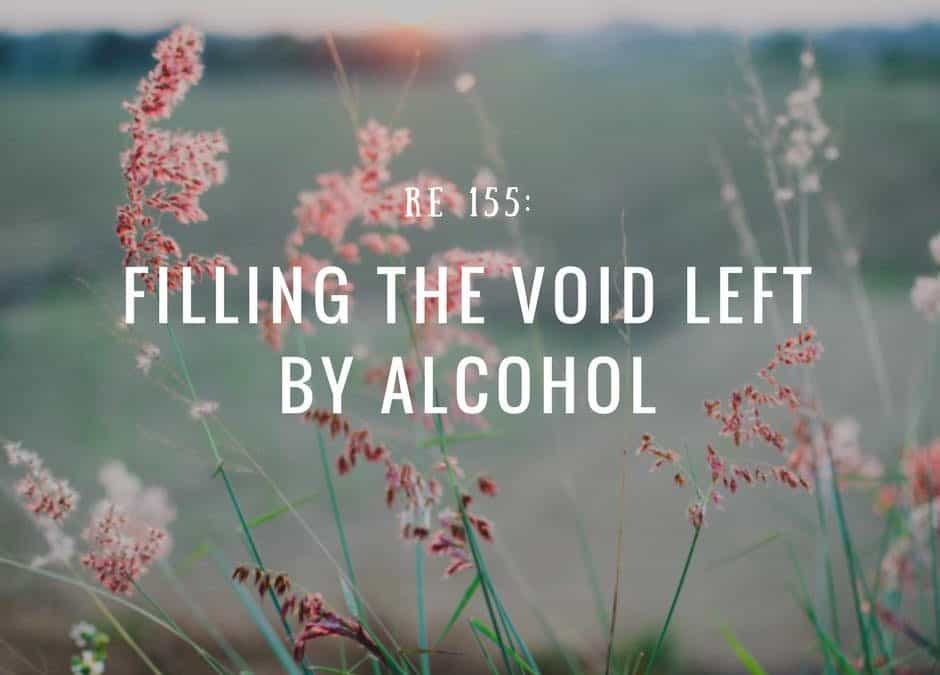Podcast: Play in new window | Download
Subscribe to the Recovery Elevator Podcast Apple Podcasts | RSS | More
“For us to be successful in sobriety, we must fill the void left by alcohol.”
-Russel Brand, Recovery: Freedom from Our Addictions
Drinking plays a big role in our lives. Many of our social gatherings revolve around it. We use it to relax or to deal with difficult emotions. When we quit drinking, a void is then created that can be felt across many areas of our lives. What do we do with this? Should we fill it? With what?
When the void is present, some try to use willpower to ignore it or to muscle through or around it. Unfortunately, studies show that willpower is a finite resource and can not be solely relied upon to quit successfully. If the void (also known as the emotional and spiritual causes of alcoholism) isn’t properly dealt with, one can become what is known as a “dry drunk.” The behaviors, coping mechanisms, and mindsets of the alcoholic are still present; the only difference is the lack of alcohol consumption.
In sobriety, we find ourselves with more… more time, more energy, and more mental clarity. It’s important to fill this time and spend this energy in a healthy and productive way so that the reasons for the void’s existence begin to disappear as we lay a healthy and solid foundation for living. Find things you like to do, and more importantly, find the communities surrounding those activities and do your best to become a part of them.
Chrissy, with 2 and ½ years, talks about how she married her drinking buddy:
SHOW NOTES
[12:50] Paul Introduces Chrissy.
Chrissy has been sober for 2 and ½ years. She’s from Mill Valley, California. 48 years old. District Sales Manager. Mother of two teenage boys. She has two dogs. Married.
[14:42] When did you first realize you had a drinking problem?
She used to be in denial. She married her drinking buddy. Started dabbling to get out of her head. Became a problem when she moved to a town where everyone drank. Started drinking daily. Lead to a health scare.
[17:10] What was it like to find out you had Grade A Liver Cirrhosis?
She lost a lot of weight. She was mistaken for someone who was pregnant. Ignored swelling abdomen and yellow eyes. Eventually couldn’t ignore symptoms. The doctor called her an alcoholic. She says the doctor is a good place to go for help.
[20:50] Did you ever attempt to moderate or control your drinking?
She always tried to manage it. She had an idea for a perfect medium buzz. The health scare is what made her consider quitting.
[22:47] What was it like when you first quit?
It took a few weeks for her body to repair itself. She now gets checked up regularly.
[25:30] What did you learn about yourself during this process?
Once the fog was lifted, she began to ponder why she drank. Now she says it isn’t important. It’s more important to stay sober. Year 1 was “how do I stay sober?” and now year 2 is “how do I manage my emotions?”. Year 3 is now easier and more relaxing.
[27:10] What was it like to cut ties with alcohol completely?
She felt like she was kicking her best friend to the curb. She had to get it out of her immediate surroundings. At first, she felt sad, was white knuckling it. Now she feels that quitting drinking was the one thing that changed her life completely.
[31:17] What does a day in recovery look like for you?
A neighbor took her to a meeting. Found a sponsor. Podcasts. Reading books. Surrounding myself with sobriety. Changed her priorities.. recovery, then family, then work.
[33:25] What was it like to marry your drinking buddy?
She used to blame him a lot for her drinking. She noticed that he drinks less. They did therapy together. She’s focusing on herself. She’s not sure whether or not her husband is an alcoholic.
[36:00] What advice do you have for someone in recovery which is with someone who drinks?
Changed her perspective. Release me from the bondage of “self”. She focuses on herself. She sees her partner more with compassion.
[39:40] What do you have to say to a person who is scared of quitting because they feel they might become depressed?
Reach out and get some help. Any hospital will help you to quit drinking. Get to a safe place… get over the hump, just for a few days.
[42:20] Rapid Fire Round
- What was your worst memory from drinking?After delivering a baby, all she wanted to do was get home and have a drink.
- Did you ever have an “oh-shit” moment?When a colleague told her that her eyes were yellow.
- What’s your plan moving forward?Continue to stay in the middle of the herd. Continue to work with the sponsor, and keep going.
- What’s your favorite resource in recovery?Her community in recovery.
- What’s the best advice you’ve ever received (on sobriety)?“If your ass falls off, pick it up and come to a meeting.”
- What parting piece of guidance can you give listeners who are in recovery or thinking about quitting drinking?If you’re thinking about it, just go for it. If it’s not for you, you’ll know.
- You might be an alcoholic if…A worker at the grocery store mistakes your alcohol purchase as being for a large group of people.
Resources mentioned in this episode:
Recovery: Freedom from Our Addictions by Russell Brand
Connect with Cafe RE– Use the promo code Elevator for your first month free
Sober Selfies! – Send your Sober Selfie and your Success Story to info@recoveryelevator.com
“We took the elevator down; we gotta take the stairs back up, we can do this!”



